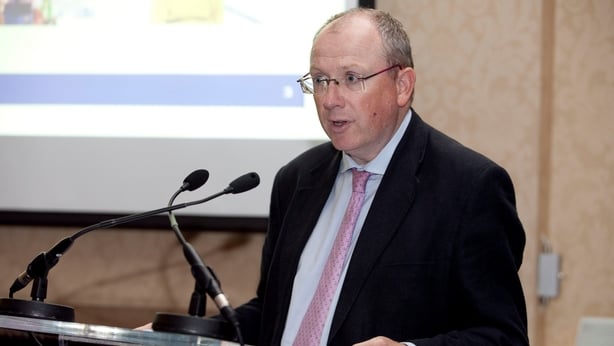Permanent TSB said it can cover over 80% of an €855m capital hole identified in European bank stress tests and is finalising plans to raise capital from private investors to fill the rest.
The other Irish banks included in the assessment - Bank of Ireland, AIB, Ulster Bank and Merrill Lynch International Bank - have passed all aspects of the tests.
The 99.2% state-owned bank said the shortfall at the end of 2013 would largely be dealt with by financial actions taken so far this year and existing contingent convertible bonds held in the bank.
PTSB recently sold two portfolios of mortgage loans and has hired Deutsche Bank and Davy Stockbrokers to help raise funds.
Permanent TSB's chief executive Jeremy Masding said the bank would "very probably" seek to raise additional capital on top of the residual shortfall he put at around €125m. The mechanics of the deal had not yet been discussed.
The bank was tested against a series of adverse scenarios such as a 1.3% fall in gross domestic product this year and a 3.5% drop in house prices.
The Government expects the economy to grow by almost 5% this year while house prices are up 15% year-on-year.
Finance Minister Michael Noonan said PTSB would seek to raise the capital in the first half of 2015.
The Government could cut the shortfall by converting €400m worth of contingent capital notes it holds in the bank, known as CoCo bonds, into equity.
In a trading update released on Friday, PTSB said it had for the first time reduced the amount of money set aside to cover losses on bad loans in the third quarter as it made further progress towards profitability.
The mortgage lender sees a return to group profit by 2017.
PTSB, which has two weeks to respond to the ECB with its capital raising plan, has been awaiting a verdict from the European Commission on a restructuring plan submitted last year to carve a "good bank" out from its troubled loans.
It said it would shortly submit an updated plan.
Permanent TSB Bank is one of 25 European banks to have failed the ECB stress tests.
Under the stress test results, PTSB has been told it faces a gross capital shortfall of €854.8m.
The comprehensive assessment carried out by the ECB was in two parts - an Asset Quality Review (similar to the Balance Sheet Assessment carried out on the Irish banks last year as part of the Troika process), and a Stress Test, involving a baseline and a stress scenario.
The stress level was viewed as much tougher than previous tests, and lasts for a three year period from the beginning of 2014 to the end of 2016.
PTSB passed the baseline scenario in all years, but failed the stress case at the end of 2016, leaving the bank with a large capital shortfall.
 The Central Bank said today the results should have no adverse impact on customers or on the day to day operations of the banks.
The Central Bank said today the results should have no adverse impact on customers or on the day to day operations of the banks.
Under the baseline scenario, banks are required to have at least 8% common equity tier one capital - a key measure of of a bank's financial strength - at the end of 2016. In the stress case scenario, the banks are required to have CET1 of 5.5%.
At the end of 2013, PTSB had a CET1 ratio of 13.13%. Under the Asset Quality review this comes down very slightly to 12.84%.
Under the baseline scenario of the stress test, its CET1 falls to 8.82%, but under the stress case scenario it falls to 0.97%.
To meet the minimum capital requirement under the stress case scenario, PTSB has to raise a gross sum of €854m. However the actual amount it will have to raise will be less than this, as it already has some sources of additional capital it can call on.
PTSB already has €400m of a type of bond known as a Contingent Convertible note, which can convert into equity in the event of a shortfall. How much of this will finally be allowed to offset against the gross shortfall is to be decided in talks with the regulator in the coming weeks.
It can also use any profits it makes to fill in the shortfall, and it can raise money by selling off parts of the business.
Because PTSB has not had a restructuring plan approved by the European Commission, the stress tests have been carried out on a so called "static" basis, assuming no change in the size and composition of the banks balance sheet over the next three years.
In reality the banks is downsizing, which will affect its capital structure.
Today's results from the ECB show that AIB has an adjusted CET1 ratio of 14.64%, which falls to 12.43% in the baseline scenario, and 6.92% in the stress scenario.
Bank of Ireland has an adjusted CET1 ratio 11.82%, but this rises under the baseline scenario to 12.43%. Under the stress scenario it drops to 9.31%
Ulster Bank has an AQR adjusted CET1 ratio of 11.55%, which drops to 10.02% in the baseline scenario, and falls to 6.21% in the stress scenario.
Merrill Lynch International Bank has an AQR adjusted CET1 ratio of 14.89%, falling to 10.94% in the baseline scenario and 9.47% in the stress scenario.
None of these banks require any further capital under the terms of the ECB's comprehensive assessment.
In a statement, the Central Bank said that the ECB's Asset Quality Review resulted in an average capital adjustment equivalent to just 0.3% of risk weighted assets for Irish institutions. It said this confirmed the "robustness" of the balance sheet assessments undertaken by the Central Bank at the end of last year.
"The results of the stress scenario show all Irish based institutions meet the ECB requirements to have, under the baseline scenario, at least 8% common equity tier one capital through to end-2016," a statement from the Central Bank said.
PTSB says test results will have no impact on customers
Permanent TSB has confirmed that it is in advanced planning with international investment bank, Deutsche Bank, to raise capital from investors in the coming months.

Group chief executive Jeremy Masding said the lender has already addressed over 80% of the €855m shortfall that the ECB identified in the adverse scenario to the Group's Balance Sheet at the 31 December 2013.
"The tests were based on our position at the end of December last and we've made huge progress since then on a number of fronts so we've already provided for over 80% of the shortfall that the ECB identified," Mr Masding said in a statement.
"We look forward to bringing international investors on board now to raise the remaining amount which will leave the bank fully in line with the ECB requirements," he added.
Speaking on RTÉ's This Week programme, he said the bank needed around €125m, and he believed that PTSB will be an attractive investment option for the markets.
Permanent TSB also confirmed that the result of the stress rests will have no effect on the day-to-day operations of the bank and no impact on customers.
"Customers are unaffected by these tests are are not required to do anything as a result of today's news," the bank's CEO added.
Anda sedang membaca artikel tentang
Permanent TSB fails bank stress test
Dengan url
http://newsdeadlineup.blogspot.com/2014/10/permanent-tsb-fails-bank-stress-test.html
Anda boleh menyebar luaskannya atau mengcopy paste-nya
Permanent TSB fails bank stress test
namun jangan lupa untuk meletakkan link
Permanent TSB fails bank stress test
sebagai sumbernya
0 komentar:
Posting Komentar